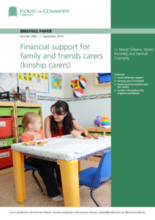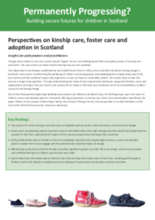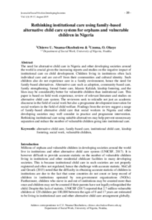Displaying 131 - 140 of 579
In this video, Children in Families ABLE project practitioners discuss their key learning with respect to supporting caregivers to care for children, including the importance of managing stress and expectations, developing trusting relationships and taking a whole family approach to support.
This House of Commons Library briefing paper considers what help is available for grandparents and other family and friends carers (also known as kinship carers) looking after children where their parents are not in a position to do so.
‘Children Safe, Family Together', the new family and kin care model outlined in this paper forms an integral part of the overall strategy being currently implemented by Territory Families (TF) to transform Out-of-Home Care in the Northern Territory (NT) and address worrying trend data pointing to the significant over-representation of Aboriginal and Torres Strait Islander children in the NT child protection system.
This report examines home visiting models and curricula, state- and federal-level policies related to early care and education and home visiting, funding streams to support early care and education and home visiting, and the perspectives of home-based child care (HBCC) providers and parents in order to explore the potential for scaling up this model of professional development for HBCC providers in the United States.
Part of the 'Permanently Progressing? Building secure futures for children in Scotland' study, this briefing draws upon the voices of children, carers and adoptive parents in Scotland, offering perspectives on kinship care, foster care and adoption.
This article examines the challenges encountered by, and the opportunities available to, young adults as they transition from informal kinship-based foster care to independent living in the Bikita District of Zimbabwe.
Through a thematic content analysis of qualitative interviews with members of migrants’ families, this article illustrates that in the context of internal labour migration, family responsibilities shift in ways that make unemployed grandmothers in South Africa who do not receive the Old Age Grant vulnerable.
This paper is based on field work experience, review of relevant literature and studies on alternative child care system in Nigeria.
This rapid evidence review is intended to contribute to the drafting of authoritative guidance to assist courts in the UK in making Special Guardianship Orders (SGOs) and to help inform decision-making by frontline practitioners.
The purpose of this paper is to ascertain care available to the rural elderly persons and their role as carers for their grandchildren and implications on their wellbeing.







